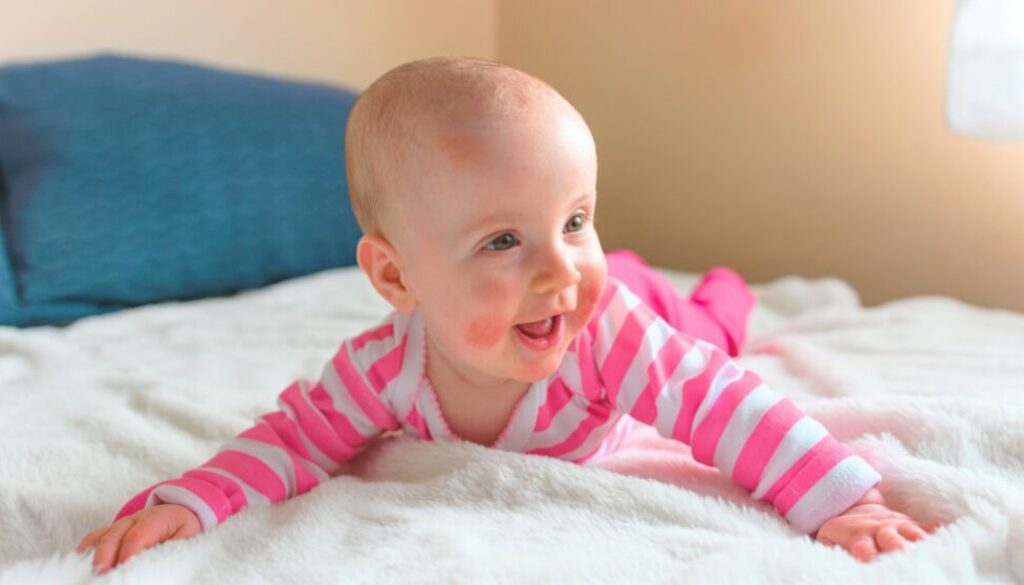Baby Rashes: When to Seek Medical Care
Skin rashes and irritations on among the top reasons parents of small children visit the doctor. “Most baby rashes are not serious and generally clear up on their own,” says Dr. Stephen Replenski, a pediatrician with CMC Pediatrics in Carolina Forest, “but that doesn’t mean that they don’t make us worry.”
Dr. Replenski is sharing his insight into this concerning problem, so you’ll have a clearer understanding of different types of baby rashes and when it’s essential to seek medical care.
Why Do Babies Get Rashes?
Babies have delicate skin that is still adapting to the world around them. It’s not uncommon for them to develop rashes as their skin interacts with new environments, fabrics, and even their own bodily functions.
“Rashes are swelling or irritation of the skin making it appear red, bumpy, lumpy, or scaly,” describes Dr. Replenski. “Sometimes it’s itchy and sometimes it occurs when your baby is feverish. Rashes can also be the result of an allergic reaction which would be more concerning.”
While most rashes are harmless and resolve on their own, it’s important to differentiate between common rashes and those that require medical attention.
Common Types of Baby Rashes
- Diaper Rash: This is perhaps the most common rash in babies. It occurs due to prolonged contact with moisture, urine, and feces in the diaper area. You can usually manage diaper rash by keeping the area clean, dry, and using diaper rash creams. It can also be due to yeast, so if you have a diaper rash that is not going away despite those interventions, you may want to have it checked out.
- Heat Rash: Also known as prickly heat, heat rash appears as tiny red bumps. It’s caused by blocked sweat ducts in hot and humid weather. Dressing your baby in lightweight, breathable clothing and keeping them cool can help prevent heat rash.
- Cradle Cap: This rash appears as flaky, crusty patches on a baby’s scalp. It’s harmless and usually resolves on its own, but you can gently massage the scalp and use a mild baby shampoo to help loosen the flakes.
- Eczema (Atopic Dermatitis): Eczema causes red, itchy, and dry patches on the skin. While it can be uncomfortable for your baby, it’s manageable with moisturizers and, in severe cases, prescribed creams.
- Drool Rash: Drool rash is a form of eczema that is caused when your baby’s saliva irritates their skin and lips creating a rash around their mouth.
- Baby Acne: Small red or white bumps may develop on your newborn’s face and other areas of the body usually two to four weeks after birth but may last until 3 months of age.
- Food Allergies: A skin rash, such as hives, which can be accompanied by vomiting and diarrhea are potential symptoms of an allergic reaction to a certain food.
When to Seek Medical Care
While many rashes are benign and self-limited, it’s best to take your baby to their healthcare provider for a diagnosis of the underlying cause of the rash and to find out what treatment is needed, if any. Some symptoms should not be ignored and indicate that seeking medical care is crucial:
- Fever: If your baby develops a rash along with a fever, it could be a sign of an underlying infection. Contact your pediatrician promptly.
- Blisters or Ulcers: Rashes that develop blisters, ulcers, or sores warrant immediate medical attention, as they could indicate a more serious condition.
- Rapid Spreading: If a rash rapidly spreads or worsens, consult a healthcare professional. This could indicate an allergic reaction or an infection.
- Painful Rash: If your baby seems uncomfortable, irritable, or in pain due to the rash, don’t hesitate to reach out to your pediatrician.
- Persistent Rash: A rash that doesn’t improve after a few days or is recurrent might require a professional evaluation.
- Rash with Breathing Difficulties: If your baby has a rash along with difficulty breathing, seek medical help immediately, as it could indicate a severe allergic reaction.
Remember, parents, you know your baby best.
“If something doesn’t seem right or if you’re unsure about a rash, it’s always better to err on the side of caution and consult your pediatrician,” recommends Dr. Replenski. “In most cases, a simple examination can determine the cause and allow your child to get on appropriate treatment or put your worries to rest.”
CMC Pediatrics is Here for Your Family
As a parent, seeing your child unwell can be challenging, but remember that rashes, allergies, and other ailments are a common part of childhood. If you have any doubts or concerns about what your child is experiencing, don’t hesitate to reach out to your baby’s pediatrician for guidance. If you don’t have a pediatrician, you are welcome to visit Dr. Stephen Replenski or one of our other pediatric specialists at CMC Pediatrics in Carolina Forest on Postal Way. Your baby’s well-being is our utmost priority, and we are here to support you every step of the way.

Dr. Stephen Replenski
Dr. Replenski is a board-certified pediatrician who cares for children of all ages from newborns to teens. He is especially focused on wellness and preventive care including routine well visits, making sure children are up to date on vaccinations, and encouraging a healthy lifestyle through nutrition and exercise.




